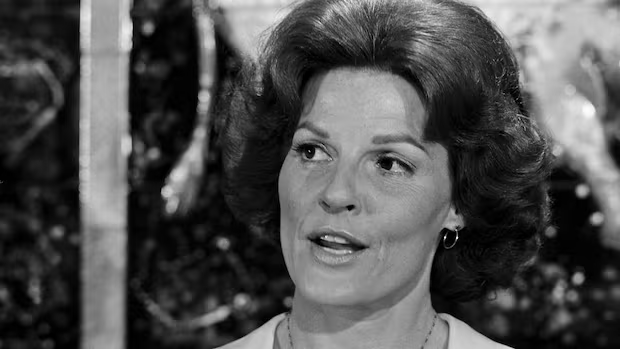Anita Bryant, a former Miss Oklahoma, Grammy-nominated singer and the one-time face of orange juice, who became known over the second half of her life for her outspoken opposition to gay rights, has died. She was 84.
Bryant died Dec. 16 at her home in Edmond, Okla., according to a statement posted by her family to news site The Oklahoman on Thursday. The family did not list a cause of death.
At the height of her visibility, she was a polarizing figure, embraced as a poster girl by the religious right and condemned by those in show business for her campaign against gay rights.
Bryant was a Barnsdell, Okla., resident who began singing at an early age, and was just 12 when she hosted her own local television show. She was named Miss Oklahoma in 1958 and soon began a successful recording career, her hit singles including Till There Was You, Paper Roses and My Little Corner of the World. A lifelong Christian, she received two Grammy nominations for best sacred performance and one for best spiritual performance, for the album Anita Bryant … Naturally.
By the late 1960s, she was among the entertainers joining Bob Hope on his USO tours for troops overseas, had sung at the White House and performed at the national conventions for both the Democrats and Republicans in 1968. She also became a highly visible commercial spokesperson, her ads for Florida orange juice featuring the tag line, “A day without orange juice is like a day without sunshine.”
Legacy of virulent anti-gay rights crusading
But in the late 1970s, Bryant’s life and career began a dramatically new path. Unhappy with the cultural changes of the time, she led a successful campaign to repeal an ordinance in Florida’s Miami-Dade County that would have prohibited discrimination based on sexual orientation.

A pie is thrown at Bryant during a news conference on Oct. 14, 1977, in Des Moines, Iowa. (The Associated Press)
In a 1978 interview with Playboy, Bryant claimed that she was moved to act because she believed those who wanted the right to not lose their job just because of their sexuality were thus “asking for special privileges that violated the state law of Florida, not to mention God’s law.”
During a televised press conference in 1977 in Iowa about her crusade against homosexuality, she had a pie thrown in her face by gay-rights activist Thom Higgins.
“At least it was a fruit pie,” Bryant quipped, then began to pray for Higgins before bursting into tears.
“Thus always to bigots,” said Higgins, who also coined the term gay pride, before he was escorted out.
The pieing was one of the early incidents of someone being pied in the face as a political protest, and would become one of the most enduring moments of Bryant’s life.

In this June 26, 1977, file photo, demonstrators carry signs of, from left, Adolf Hitler, Bryant, the Ku Klux Klan and Idi Amin, chanting ‘Human rights now,’ during the annual Gay Freedom Day March in San Francisco. (The Associated Press)
Although the campaign was successful, it also cemented Bryant in the public’s mind as a religious crusader bent against gay rights, instead of a former entertainer. She became a punchline on shows such as Saturday Night Live, the TV series Maude, and The Carol Burnett Show, where Burnett dressed as Bryant for a skit in which she sang and served orange juice to drag queens and actors dressed as LGBTQ+ icons.
Supported by Rev. Jerry Falwell among others, Bryant continued to oppose gay rights around the country and became the object of much criticism in return.
Activists organized boycotts against products she endorsed, designed T-shirts mocking her and named a drink for her — a variation of the screwdriver that replaced orange juice with apple juice. The boycott almost cost her the contract with the Florida Citrus Commission, which would eventually decline to renew her contract in 1980, and she lost other opportunities among the controversy, including a contract to have her own TV show.
Her career in entertainment declined, her marriage to her first husband Bob Green broke up, and she later filed for bankruptcy.

Anita Bryant in her home in Miami Beach, Fla., June 7, 1978. (Kathy A. Willens/The Associated Press)
In Florida, her legacy was challenged and perpetuated. The ban against sexual discrimination was restored in 1998.
“She won the campaign, but she lost the battle in time,” Tom Lander, an LGBTQ+ activist and board member of the advocacy group Safe Schools South Florida, told The Associated Press on Friday.
But Lander also acknowledged the “parental rights” movement, which has spurred a recent wave book bannings and anti-LGBTQ+ laws in Florida led by such conservative organizations as Moms For Liberty, had its roots in the harmful rhetoric Bryant spread.
“It’s so connected to what’s happening today,” Lander said.
Bryant spent the latter part of her life in Oklahoma, where she led Anita Bryant Ministries International. Her second husband, NASA test astronaut Charles Hobson Dry, died last year. According to her family’s statement, she is survived by four children, two stepdaughters and seven grandchildren.



